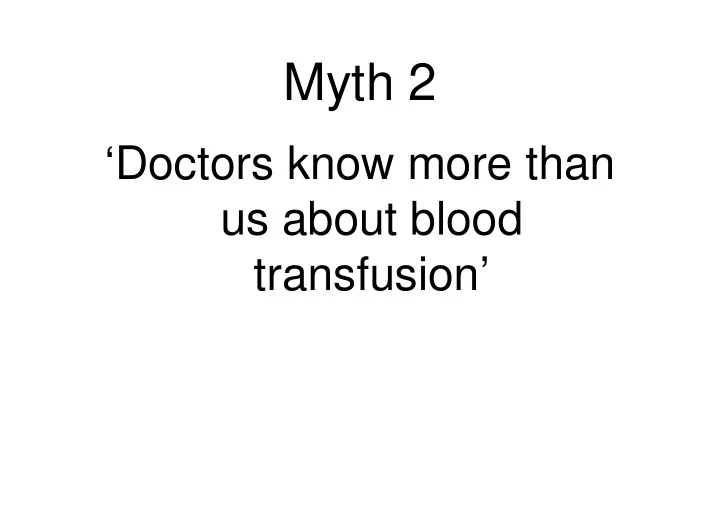

Myth 2 ‘Doctors know more than us about blood transfusion’
Depends… •Basic transfusion education in medical school and as FY1/2s •Pick up practice on wards…good and bad – Non-haem consultants can be ‘out of date’ – Trainee doctors reluctant to challenge consultant’s authority – this is where you can help...
• Laboratory staff complete lengthy training and education in blood transfusion science • Annual competencies, CPD programme, NEQAS • Knowledge extensive in certain areas but lacking in clinical relevance – Can offer valuable support and education – Can direct to guidelines, haematology advice
Myth 2 MYTH BUSTED! ‘Doctors know more than us about blood transfusion’
Collaboration • Working together is the key • We know stuff, they know stuff – not the same stuff, but important stuff! • Stronger as a team with a common goal – best practice for best patient outcome
Myth 3 ‘I don’t have the authority to challenge’
Facts • Know your rights and responsibilities – BMS: • HCPC registration – must take responsibility for own actions – Medical staff: • GMC and medical liability insurance - as above, but with extra cover • Be aware of your place in the clinical pathway – does the buck stop with you? • Doctors make the difficult decisions and take ultimate responsibility for the patient in their care • You will be held responsible for any avoidable delay in provision which results in patient harm
So what does that mean? THIS IS IMPORTANT • You have the authority to challenge a request, but… • You do NOT have the authority to refuse it • It’s important they know you aren’t saying ‘No’, you are just seeking advice • So…if you get a request that doesn't ‘fit’ the guidelines…
Establish clinical urgency immediately Patient has life-threatening bleeding/trauma/arrest? • Start processing request • Refer them to relevant Trust guidelines • (bleeding - suggest they declare Major Haemorrhage?) • Tell them this request must be reviewed by the • Recommend they discuss Transfusion Team and with haematologist ASAP explain how it doesn’t meet • Take name and number Trust guidelines and contact on-call haem • Ask for their contact details medic yourself! and aim for a prompt response
Myth 3 MYTH BUSTED! ‘I don’t have the authority to challenge’
To achieve this? • Guidelines must be pragmatic and comprehensive, well evidenced – NICE, BCSH • Accessible to lab staff & medical staff • Medical staff must know the lab staff will challenge requests – Medical induction/teaching – Governance meetings etc. • Good education for medical staff • Changes hospital perception of labs – Will start asking labs for advice – Supportive service • AfC banding
What if things get heated? • Empathise – you do not have the patient in front of you • It takes two…try not to get sucked in • Always be polite and calm, constructive and helpful • This is where robust guidelines help • Take their name and contact number • Document everything PASS IT ON TO A HAEMATOLOGIST REMEMBER: no-one has the right to be rude or abusive there is a patient at the end of this – it’s not • about you • We’re all on the same side – common goal
Essentials for an empowered blood transfusion lab? � Educated, competent, supported and motivated team of BMSs � Enthusiastic blood transfusion manager and TT � Clear guidelines for use of all components � Supportive haematology medical team
Thanks! Any questions?
Recommend
More recommend